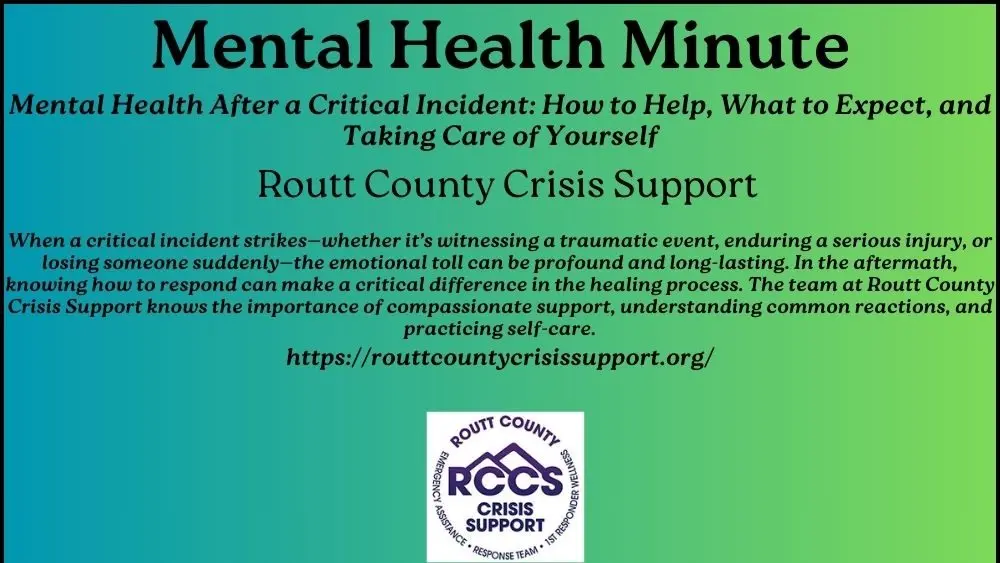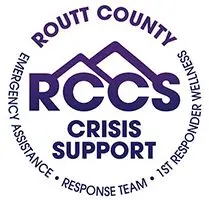
(Graphics provided to Steamboat Radio.) This is a weekly update. Visit YampaValleyResources.org today to explore all the resources available for you and your household. Together, we are working to create a stronger, more resilient Yampa Valley where everyone has access to the resources they need to thrive.
This is the continued Mental Health Minute, beginning July 7, 2025.
LINK to all previous Mental Health Minutes — DECEMBER 1, 2024, THROUGH JUNE 23, 2025
- Aug. 17, 2025 — Mental Health Minute: Uncertainty Is Part of Life — But It’s Heavier for Some
- Aug. 11, 2025 — Mental Health Minute — Re:generation: A Christ-Centered Path to Lasting Transformation
- Aug. 3, 2025 — Mental Health Minute — Steps to Help Save A Life
- July 28, 2025 — Mental Health Minute — Steamboat Kids & Phones
- July 24-2025 — Mental Health Minute — Starting with the basics
- July 15, 2025 — Mental Health Minute – Helping Others through Peer Engagement and The HOPE Initiative
Mental Health After a Critical Incident: How to Help, What to Expect, and Taking Care of Yourself
By Molly Lotz, Director of Therapeutic Operations for Routt County Crisis Support

When a critical incident strikes—whether it’s witnessing a traumatic event, enduring a serious injury, or losing someone suddenly—the emotional toll can be profound and long-lasting. In the aftermath, knowing how to respond can make a critical difference in the healing process. The team at Routt County Crisis Support knows the importance of compassionate support, understanding common reactions, and practicing self-care.
Compassion in Action: Supporting Others Through Trauma
In the immediate wake of a critical incident, offering support doesn’t require grand gestures—simple, grounded acts of care are often the most meaningful.
- Keep your approach gentle and straightforward. Sometimes, offering a glass of water or a blanket speaks louder than words.
- Instead of probing with open-ended questions, helpers are advised to use simple yes/no inquiries or offer comfort directly. It’s important to remember that you can’t fix their pain—your presence alone often means the most.
- Shielding those affected from the media, crowds, or insensitive remarks is also essential.
- Attending to basic needs—warmth, nourishment, a quiet place to rest—can be grounding.
- Helping to facilitating contact with loved ones or clergy can further aid recovery.
- Be a steady presence. Listen if they want to talk. Respect their silence if they don’t.
What to Expect: Common Reactions to Trauma
Trauma responses vary widely and evolve over time. Understanding these patterns can help both survivors and their support networks cope.
Immediately After the Incident
In the early hours, reactions are often physical due to the body’s ‘fight or flight’ response. Feelings of detachment, crying, nausea, and distorted senses are common. Some may feel overwhelmed or frozen in place. Calming activities, such as drinking cold water or placing a cool cloth on the back of the neck are recommended to soothe the nervous system.
Within a Few Days
As the brain begins processing the trauma, emotional symptoms become more pronounced. Sleep disturbances, brain fog, stomach issues, and irritability may arise. Intrusive thoughts or hypersensitivity are not uncommon.
During this stage it is important not to rush the recovery. Be sure to get rest, move your body, and if possible, avoid making big decisions.
Three to Seven Days Later
By this stage, physical symptoms often ease, but psychological effects may deepen. Relationships might strain, and feelings of guilt, anxiety, or withdrawal can emerge. In some cases, flashbacks, substance use, or persistent insomnia may occur.
Tip: Spend time with trusted people, share your story only when you feel ready, and avoid harsh self-judgment. Routines, relaxation, and limiting stimulants or alcohol are key.
When to Seek Professional Help
For many, symptoms gradually fade with the support of loved ones. However, intervention may be needed if:
- Emotional or physical distress becomes overwhelming
- Symptoms worsen rather than improve
- Nightmares or intrusive thoughts persist
- Alcohol or drug use increases
- Relationships begin to suffer
If you’re struggling, reach out. There’s no shame in needing help. Local therapists, such as those at steamboatcounseling.com, can provide professional guidance.
Taking Care of Yourself
Even if you weren’t directly involved, witnessing or responding to trauma can have lingering effects. It’s normal to feel rattled—or even guilty. Be patient and compassionate with yourself. Self-care tips include:
- Prioritize sleep, nutrition, and hydration
- Learn about acute stress responses
- Connect with others and talk when you’re ready
- Return to routines and physical activity
- Practice mindfulness and relaxation techniques
- Limit alcohol, nicotine, and caffeine
- Join group debriefings if helpful
- Seek therapy if you feel overwhelmed
The path to healing is rarely linear. But with understanding, patience, and support, recovery is not only possible—it’s expected.